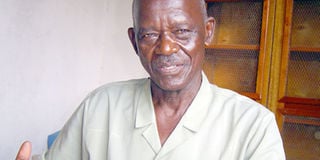Prime
The ‘encyclopaedia’ of Alur leaves unforgotten legacy

John Alfred Orochi, the former minister of Culture,Tourism and Antiquities
What you need to know:
John Alfred Orochi, the former minister of Cwas best known for his study of the migration of the Luo ethnic group.
Why do bad things happen to good people? This was the question many mourners asked themselves at the emotional burial of the man behind the documentation of the history of the Luo migration.
John Alfred Orochi, who was the minister of Culture, Tourism and Antiquities in the Alur Kingdom, was involved in a fatal accident in Paidha town as he was returning from a weekly radio talk show on culture (Vul pa Jalur) when he was knocked by another motorcycle. He was then rushed to Goli Health Center IV and later to Nebbi Hospital, but he died at 3am on January 14.
Orochi built his interest in Luo culture in 1957, when an Austrian Verona missionary, Late Rev Fr Crazzalara Paskwale took him to Lodonga Primary Teachers’ College, where he was trained as a historian for the Luo people.
Despite a troubled study period, Orochi emerged the best candidate in the PTS exams in Uganda.
In an interview with Sunday Monitor on November 7, 2006, he narrated how in 1956, the priest took him for a study tour to Yei in Sudan, Wao, Khartoum and Gondokoro, a home place for the Luo, Madis, Lugbara, Kokos and other tribes. He also interacted with tribes like Jurcol, Zandes, and Dinkas.
In January 1957, they proceeded to Aswan in Egypt where part of the Luo ethnic group is believed to have migrated. Orochi then returned to Central Africa and stayed with the Zande tribes and also went to Ethiopia.
He later visited Kenya and Tanzania to compile the history of Luo than settled in Kenya. According to him, the Luo from Kenya and Tanzania first settled at Namuwongo, in Kampala before they migrated there.
Due to his wide travels and vast knowledge, he was often invited to schools to lecture on the migration of the Luo. He said his interest was to learn about the tradition of burying kings with living people and he was writing a book challenging the custom.
At his funeral, the prime minster of the Alur Chiefdom, Dr Edwin Wathum, said: “This is a gap we cannot fill, because he was naturally knowledgeable about the Luo. He was already working on uniting all the Luo in Kenya, Ethiopia, Sudan and Tanzania.”
Dr Wathum revealed that Orochi was helpful in settling disputes among the chiefdoms and contributed to the revival and preservation of Alur culture. “We will remember him for working and researching about Nuer tribe in Sudan and Shiluk in Bar El Gazel and also the Luo in Cameroon,” he added.
The Emeritus Bishop of Nebbi Catholic Diocese said he would be missed for his passion for God because he had dedicated his life to serve God and was a great researcher on the cultural institution.
Background
The late Orochi was born on November, 16, 1930 in Afere village in Nebbi town council. He joined Nebbi Primary School at the age of nine until Primary Four then went to Angal for his primary five.
In 1951, he joined the seminary at Lacor in Gulu to continue with his primary six education as an aspirant to become a religious Marian Brother. In 1952, the few aspirants were then moved from Lacor Seminary to Lodonga (current Yumbe District), the mother house of the Marian Brothers.
Orochi completed his postulantship and novitiate in 1955. He then took his temporary vows and became a professed Brother and joined Teacher Training College. And by the end of 1959, he had completed his teacher training. In 1960, Orochi was posted to Ediofe Primary School and assigned duty to open a primary school at Kalongo, which he did successfully. Then after accomplishing the set mission, in 1963 he was then posted to teach at Nebbi primary school where he was an Old Boy.
He then joined FIAT Company, a motor company in 1968 and worked for one year. In 1972, after President Idi Amin sent him in London to assess the World’s reaction on the expulsion of the Asians, Orochi was arrested by security agents. But he fronted his profession as an English teacher to get his freedom.
In 1979, he went into exile to the then Zaire (now DRCongo) but continued with his teaching profession in Luga Primary School in Congo. During Obote II regime, upon return, he was arrested and imprisoned in Luzira.
The late was happily married to Ms Jemma Oyera Orochi with nine children. He is survived by 35 grandchildren (17 girls and 18 boys). He will be remembered for his book: Geneology of Luo Tribes, which is currently in print at Marian Printing press. The book was to be officially launched in March this year.
Through the years
1985,first headmaster and founder member of Nebbi Town Secondary School
1987, he was the secretary for Angal Hospital
In 1992, he served as chairperson of Lay Apostolate in Arua diocese
1995, headmaster of Panyimur Secondary School
Early 2000s, Permanent secretary in the Prime minister’s office in Alur Kingdom
2005,Chairman District language board.
2006, Orochi was among the cultural delegation that was invited to participate in the Juba Peace talks with Kony
2005-2012, Minister of Culture, Tourism and Antiquities Alur kingdom




